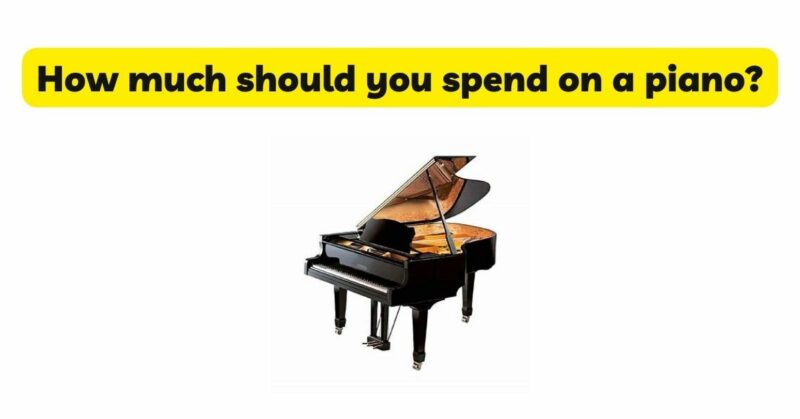Investing in a piano is a significant decision, one that requires careful consideration of several factors, including budget, personal goals, and musical aspirations. While it’s natural to want the best possible instrument, it’s essential to strike a balance between your financial resources and the quality of the piano you choose. This article aims to guide you through the process of determining how much you should spend on a piano, considering factors such as skill level, musical goals, long-term value, and available alternatives.
Skill Level and Musical Goals:
Your skill level and musical goals play a crucial role in determining the appropriate budget for your piano. If you’re a beginner or casual player seeking to explore the piano without making a substantial financial commitment, there are entry-level instruments available at more affordable price points. These pianos, while not of the highest quality, can still provide a suitable learning experience and allow you to develop fundamental skills.For intermediate players who have developed their technique and are committed to progressing further, investing in a mid-range piano might be a wise choice. These instruments offer improved sound quality, responsiveness, and durability compared to entry-level models, enabling you to refine your skills and explore a broader range of repertoire.Professional pianists, teachers, or serious enthusiasts who aspire to perform at an advanced level may find it beneficial to invest in a high-quality piano. These instruments often come with superior craftsmanship, exceptional tonal characteristics, and enhanced playability, providing the necessary tools for artistic expression and growth.
Long-Term Value and Investment:
Another factor to consider when deciding on a piano budget is the long-term value and potential investment opportunities. While pianos are primarily instruments of artistic expression, they can also hold value as assets. High-end and well-maintained pianos have the potential to retain or even appreciate in value over time. This aspect may be relevant for those who anticipate the possibility of upgrading or selling their piano in the future.It’s important to note that while pianos can retain their value, the appreciation is not guaranteed and can depend on factors such as the brand reputation, condition, rarity, and market demand. Therefore, it is wise to balance your decision-making between the intrinsic value of the piano as a musical instrument and the potential long-term investment value.
Available Alternatives:
It’s essential to explore alternative options when determining your piano budget. While a brand-new piano may be desirable, there are other avenues to consider. Used pianos, for example, can offer excellent value for money, especially when sourced from reputable dealers or individuals who have maintained the instrument well. These pianos may provide quality and craftsmanship that would otherwise be out of reach at a particular budget.Additionally, rental programs or leasing options can be viable choices, particularly for beginners or those who are uncertain about their long-term commitment to the instrument. Renting or leasing allows you to have access to a higher quality piano while avoiding the upfront cost of purchasing. It provides an opportunity to evaluate your needs, preferences, and commitment before making a more substantial investment.
Quality Considerations:
When determining how much to spend on a piano, it’s crucial to factor in the quality of the instrument. While budget-friendly pianos may offer an entry point into learning, they may lack the durability, responsiveness, and tonal qualities found in higher-end models. Higher quality pianos often feature superior materials, precise craftsmanship, and advanced engineering, resulting in enhanced sound, playability, and longevity.By investing in a piano of better quality, you can expect greater satisfaction and enjoyment during your musical journey. However, it’s important to note that the price tag alone does not guarantee quality. Researching different brands, models, and seeking advice from reputable piano technicians or experienced pianists can help you make an informed decision regarding the correlation between price and quality.
Conclusion:
Determining how much to spend on a piano is a highly individual decision influenced by several factors. It is crucial to consider your skill level, musical goals, long-term value, available alternatives, and quality considerations when establishing your budget. Striking a balance between your financial resources and the quality of the instrument is key.Remember that a piano should be viewed as more than just a financial investment—it is a gateway to artistic expression, personal growth, and a source of joy. Regardless of the budget, the most important aspect is to find a piano that resonates with your musical aspirations, inspires you to play, and supports your journey as a pianist.


